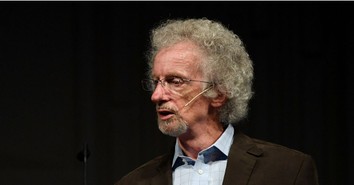Crutches and Comfort

The emergency room doctor examined my swollen ankle and said it was unlikely I had ruptured my Achilles tendon, but I may have torn it. Only an MRI could tell. He packed my leg into a soft cast, handed me crutches, and told me to contact an orthopedist the next day. As he turned to leave, I asked him how long I might be on crutches.
“Hard to tell,” he said, shrugging. “Could be weeks — months if it’s ruptured.” Then he disappeared behind the curtain.
I wheeled myself and my crutches into the waiting room and started dialing for drivers, hoping someone could rescue my car from the emergency room parking lot and take me home. As I repeated my story to several people, it slowly began to dawn on me that my summer had been severely curtailed.
The next day, I sat alone on my bed contemplating my new open-toed orthopedic summer footwear, and the pity party threatened. With no one else in the house, I had to stump my way around, a soft blue bag swinging from my neck to carry the items I couldn’t in my otherwise occupied hands. I couldn’t drive, I couldn’t walk, I couldn’t carry anything that didn’t fit in that bag.
At that moment, it seemed especially bleak to be single and uncertain about who would care for me. If only I were married, I wouldn’t have to go through this all alone, I thought. An imaginary Greek chorus of married women snorted in unison behind me: You know that’s no guarantee.
Sighing, I challenged myself to cultivate right thinking about my misfortune. My injury had happened during a slow time and right after vacation, not before. I had medical insurance (a luxury for many these days). I had friends and family nearby to help. Most importantly, I have a God who has promised never to leave me or forsake me. So I took my eyes off my bulky, black boot and began to contemplate, instead, what God’s Word might have to say to me and what His purposes might be in this injury.
Expecting God to Deliver
All of us — no matter how we classify ourselves or our relationships — have to endure some trials alone. But if we belong to God, we have one relationship with the iron-clad promise found in Philippians 4:19, “And my God will supply every need of yours according to his riches in glory in Christ Jesus.” The apostle Paul (a single man) wrote this at the close of a letter in which he briefly described his trials, shared the secret of contentment, and thanked those in the Philippian church for their partnership and their kindness in sharing his trouble. This verse was Paul’s closing exhortation to them that they also could count on the same faithful God.
Remembering this — and how it glorifies God when we come to Him in our creaturely neediness and not our self-sufficiency — I asked the Lord to provide for me in my small trial. I also asked His help not to have expectations of others. I wanted to cultivate gratitude for the unexpected ways He would supply my every need. I knew from prior experience that it would be different from my assumptions. It’s amazing to watch how God motivates others to help — if you’re looking for it expectantly.
The Lord was true to His promise. Day by day, different people came by to help or called to check on me. The Lord inspired the members of His body to care for another member. My mother showed up shortly after my injury and spent the night, friends drove me to doctor’s appointments, my boss allowed me to work from home, others called or emailed me to check on me. That wasn’t spontaneous — I did have to make my needs known — but I didn’t have to fret. I could rest in God, even when I was alone.
During this time, I read a newspaper article about how our patterns of thinking actually shape our brains. According to The Washington Post, the theory behind this is known as “neural Darwinism,” a concept advanced by 1972 Nobel Prize winner Gerald Edelman, who asserted that people become optimistic or pessimistic based on habits of mind reinforced by specific neural connections.
Once again, science proves the Word of God to be correct. It’s no wonder the apostle Paul, inspired by the Holy Spirit, commanded us to shape our brains for optimism: “Finally, brothers, whatever is true, whatever is honorable, whatever is just, whatever is pure, whatever is lovely, whatever is commendable, if there is any excellence, if there is anything worthy of praise, think about these things” (Phil. 4:8, emphasis mine).
The God of All Comfort
When one of my friends was visiting, she asked, “I wonder what God has for you in this down time.”
I pondered that during my personal devotions one day, and the verse that came to mind was from the opening section of 2 Corinthians 1:3-4. “Blessed be the God and Father of our Lord Jesus Christ, the Father of mercies and God of all comfort, who comforts us in all our affliction, so that we may be able to comfort those who are in any affliction, with the comfort with which we ourselves are comforted by God” (emphasis mine).
Our heavenly Father refers to Himself as “the Father of mercies and God of all comfort.” I did see that in the care I received from others. But now I have a fresh awareness of the inconveniences and loneliness of disabilities — temporary or otherwise. And I want to be one used by God to comfort others with the comfort I’ve received. While I knew about these needs prior to this recent injury (I have been on crutches three times before!), I now possess a renewed emotional awareness that I pray will result in increased empathy and care toward others. I want to be listening to the Holy Spirit and be used to care for the injured and hurting members of His body. As one commentary states, Paul speaks of comfort as encouragement and strengthening grace in the midst of troubles. This Greek word translated as comfort means “a calling to one’s side” for exhortation, consolation, or comfort. What a wonderful word picture of comfort — someone at your side, extending care.
To my dear single friends reading this column, I would say, let’s be carriers of God’s comfort to one another. Whether married or single, each of us has to depend on the God of all comfort. Let’s not shrink back from asking Him to meet our needs when we’re unsure of whom to rely upon, nor shrink back from being used by Him to carry the comfort we’ve received from Him to another hurting member of His body. The loneliness that we can experience at times can be turned into a moment to comfort another. Our experiences are designed by a loving God to make us more like Him, including His comforting and compassionate nature.
Originally published June 20, 2005.








